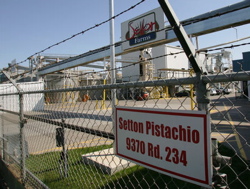 Setton Pistachio of Terra Bella, Inc. is not yet out of the regulatory woods with the U.S. Food & Drug Administration (FDA).
Setton Pistachio of Terra Bella, Inc. is not yet out of the regulatory woods with the U.S. Food & Drug Administration (FDA).
A new “Warning Letter” was sent on Sept. 14th to the Commack, NY-based company by FDA San Francisco District in Alameda, CA. FDA released the letter this week.
During inspections at the Terra Bella, CA plant last March 26th to April 30th, FDA collected and analyzed samples of its pistachios and found them contaminated with Salmonella Montevideo.
Setton then recalled all its roasted and bulk roasted pistachios that were packed before June 1, 2009. That forced food companies using Setton pistachios to recall their products.
Candy, ice cream, snacks and numerous other products were among the 664 recalls that resulted from Setton’s tainted pistachios. It was second largest ingredient recall of the year.
The new letter makes it clear that FDA is not yet satisfied with Setton’s work to clean up its act.
“The recovery of indistinguishable S. Montevideo serotype patterns from multiple processing locations within your facility indicates that Salmonella may have become established in a niche environment in your facility,” writes FDA District Director Barbara J. Cassens. “Further, finding Salmonella very near to where food is exposed indicates a high risk of product contamination.”
FDA found Setton had “prepared, packed or held” pistachios “under insanitary conditions” and “may have been contaminated with filth.”
The letter clearly expresses concern about conditions inside the Terra Bella plant. “Appropriate control of Salmonella in a food processing environment requires expert knowledge of the unique characteristics of the organism, Cassens’ letter continues. “It is essential to identify the areas of the food processing plant where this organism is able to grow and survive (niche areas) and to take such corrective actions as necessary to eradicate the organism by rendering these areas unable to support the growth and survival of the organism.”
FDA acknowledges Setton “adequately addressed” concerns about “possible routes of cross-contamination” that were raised in the government’s Form 483 Inspection Report.
“However we are concerned about your recordkeeping practices because our inspection found many of your records were either incomplete or missing,” Cassens writes. FDA will look for “corrective actions” for Setton’s record lapses in the next inspection.
The pistachio company has 15 days to respond to FDA’s “Warning Letter.” If the company responds in writing, that letter may also be posted on FDA’s website.
The only other food-related “Warning Letter” released this week went to the Trans-Caribbean Dairy Corporation on St. Thomas in the Virgin Islands.
That company was inspected on June 30 and July 1, 2009. FDA inspectors found pooled dirty water, accumulation of dust, grease and debris, and water leaks that did not conform to good manufacturing practices.
